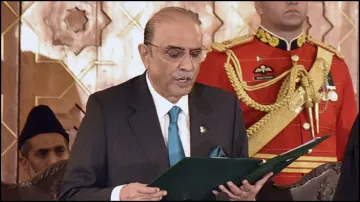Islamabad: Pakistan's newly-elected President Asif Ali Zardari and Interior Minister Mohsin Naqvi on Tuesday decided to forgo their salaries while in office citing the economic challenges faced by the country, according to the Express Tribune. The president considered it essential not to burden the national exchequer and preferred to forgo his salary, said the President's Secretariat in a statement.
“In view of the prevailing economic challenges, President Zardari has decided that he will not draw his presidential salary. He took this decision to encourage prudent financial management in the country," according to the statement.
In a similar move, the newly sworn-in Interior Minister Mohsin Naqvi also decided against drawing a salary during his service period. Taking to social media platform X, Naqvi stated that he committed to serving the nation in challenging times "in every possible way".
On March 10, Pakistan Peoples Party (PPP) co-chairman Asif Zardari was sworn in as the 14th President of Pakistan, officially taking over as the head of the state for a historic second time. Zardari is the only civilian candidate to have been elected as head of state for a second time, excluding the military heads. Earlier, he served as Pakistan President from 2008 to 2013.
Chief Justice of Pakistan Qazi Faez Isa administered the oath to the 68-year-old Zardari at Aiwan-e-Sadr, the Presidential Palace, on Sunday. Zardari replaced Dr Arif Alvi, who stayed in office for five more months despite completing his five-year term in September 2023.
He secured 411 electoral votes in Parliament and all four provincial assemblies with the backing of allied parties — mainly Pakistan Muslim League-Nawaz (PML-N) and the Muttahida Qaumi Movement-Pakistan (MQM-P). His PTI-backed Sunni Ittehad Council (SIC) rival Mahmood Khan Achakzai bagged 181 votes as he was only able to secure the majority of votes in the PTI-backed SIC-dominated Khyber Pakhtunkhwa Assembly.
Born in 1955, Zardari was brought up and educated in Karachi. He was married to Pakistan's former prime minister Zulfikar Ali Bhutto's daughter, Benazir Bhutto, who was assassinated in December 2007. From the early 1990s to 2004, he spent 11 years in jail on graft charges, which were never proven in any court and that he and his party called military-backed political victimisation, a charge the army denies.
Zardari's greatest achievement during his first term was seen as the building of a rare political consensus on adopting a new legal and political framework to decentralise power and curb the presidential powers wielded by former military leaders. He took control of the PPP Party in line with the wishes expressed in his slain wife's will.
(with inputs from agencies)
ALSO READ | Pakistan ex-PM Nawaz Sharif’s sons return to Lahore after self-exile in UK
Latest World News
